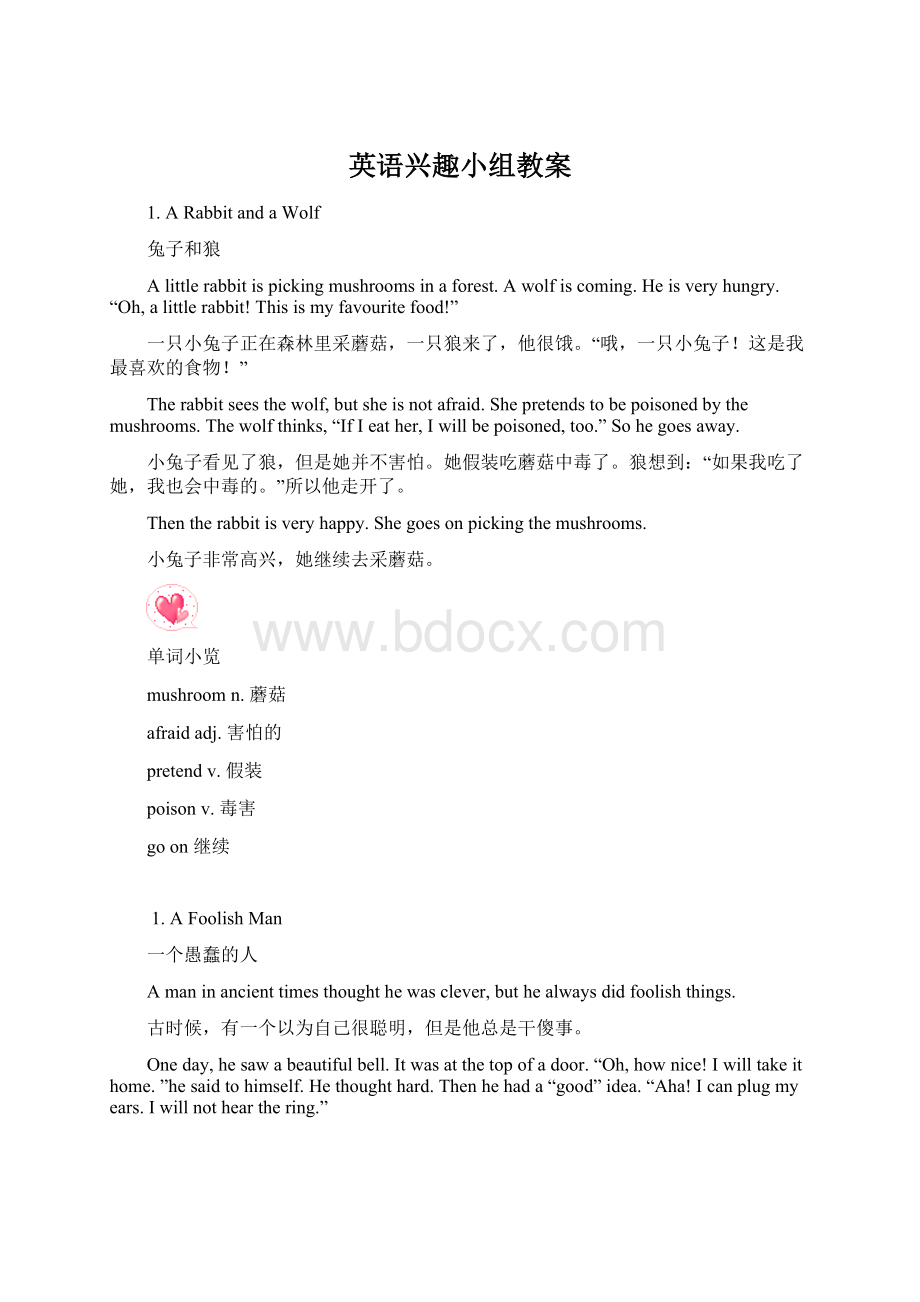 英语兴趣小组教案Word格式.docx
英语兴趣小组教案Word格式.docx
- 文档编号:18494787
- 上传时间:2022-12-17
- 格式:DOCX
- 页数:11
- 大小:26.01KB
英语兴趣小组教案Word格式.docx
《英语兴趣小组教案Word格式.docx》由会员分享,可在线阅读,更多相关《英语兴趣小组教案Word格式.docx(11页珍藏版)》请在冰豆网上搜索。

v.毒害
goon
继续
1.AFoolishMan
一个愚蠢的人
Amanin
ancient
timesthoughthewasclever,buthealwaysdidfoolishthings.
古时候,有一个以为自己很聪明,但是他总是干傻事。
Oneday,hesawa
beautiful
bell.Itwasatthetopofadoor.“Oh,hownice!
Iwilltakeithome.”hesaidtohimself.Hethoughthard.Thenhehada“good”idea.“Aha!
Icanplugmyears.Iwillnothearthering.”
有一天,他看见一个漂亮的铃铛挂在一户人家的门上头。
“啊,好漂亮!
我要把它拿回家去。
”他自言自语道。
他使劲地想,然后想到了一个“好”主意。
“哈!
我把耳朵堵上,就听不到铃声了。
Hedidso,butthebellrang.Theowneropenedthedoorandaskedangrily,“Whatareyoudoinghere?
他这样做了,但是铃铛响了起来。
主人打开门,生气地问道:
“你在这儿干什么?
foolish
adj.傻的,愚蠢的
while
conj.当…的时候
owner
n.主人
top
n.顶部
cover
v.盖上
adj.古代的
angrily
adv.生气的
plug
v.堵,塞
3.A
cleverOldMan
一个聪明的老人
Samisanoldman.Helikeswalkinginthestreetaftersupper.Andhegoeshomeatseveno’clock.
萨姆是一个老人。
他喜欢在晚饭后到大街上散步,然后7点钟回家。
Butacarstopsathishousetonight.Apolicemanhelpshimgetout.ThenhetellsSam’swife,“Theoldmangotlostinthestreet.Heaskedmetotakehimhomeinthecar.”
但是,今天晚上一辆小汽车停在他家门前。
一名警察帮助他下了车,然后他告诉萨姆的妻子:
“这位老人在街上迷路了。
他让我用汽车送他回来。
Afterthepolicemanleaves,hiswifeasks,“Sam,yougotothatstreeteverynight.Howcanyougetlost?
警察离开后,他妻子问道:
“萨姆,你每天晚上都去那条街,你怎么会迷路呢?
“Iamnotlost.Ijustdon’twanttogohomeonfoot.”Samanswers.
“我没有迷路。
我只是不想走路回家。
”萨姆回答道。
tonight
n.今晚,今夜
getlost=belost迷路
leave
v.离开
on
foot
步行
4.
CatIsFishing
猫咪钓鱼
Acatgoestoarivereveryday.Hewantstogofishing.Buthecan’tcatchanyfish.
一只猫每天去河边,他想去钓鱼,但是他去钓不到一条。
Oneday,hegoestotheriverasusual.Suddenlyafishcomesout.Hecatchesthefish.Heisveryhappy.Heforgetstoputthefishinthebasket.Hedancesandsings.Heshouts,“Ihaveafish!
Ihaveafish!
”Allhisfriendscometoseehim.
一天,他像往常一样去了河边。
突然一条鱼浮出了水面。
他捉到了那条鱼。
他非常开心。
他忘记把鱼放到篮子里去了。
他又唱又跳,叫道:
“我捉到一条鱼!
我捉到一条鱼!
”他所有的朋友都过来看。
“Whereisyourfish?
Letushavealookatit.”hisfriendssay.
“你的鱼在哪儿?
让我们看一看。
”他的朋友们说。
“It’sthere,nearthebank.”thecatanswers.Buthecan’tfindthefish.Whenhesingsanddances,thefishjumpsbackintotheriver.
“在那儿,河岸附近。
”猫回答道。
但是他找不到那条鱼。
当他又唱又跳的时候,鱼跳回了河里。
asusual
像往常一样,像平常一样
suddenly
adv.突然地
forget
v.忘记
havealookat看一看,看一眼
shout
v.叫,喊
bank
n.河岸
5.LookatanEnemyasaFriend
把敌人当朋友
Oneday,afarmerworksinhisfields.Thewindblowshard.Hefeelsverycold,sohegoeshome.
一天,农夫去田地里干活。
风很大,他感觉很冷,所以就回家了。
Onhiswayhome,hesawafrozensnake.Hepickeditupandputitinhischest.Hetriedtowarmit.Sometimelate,thesnakewaswarmandactive.Itbitthefarmerinthechest.
在路上,他看到一条冻僵的蛇,他把它捡起来,放进了自己的胸口,他想让蛇暖和暖和。
过了一段时间,蛇暖和过来了,并且活动起来,它在农夫的胸口咬了一口。
Thesnakewaspoisonous.Thefarmerwasdead.Beforehedied,thefarmersaid,“I’msosilly.Ilookatanenemyasafriend.”
蛇的牙齿是有毒的,农夫就死了。
在死之前,农夫说:
“我真傻啊,我把敌人当朋友。
”
frozen
adj.冻僵的
chest
n.胸口
warm
v.使温暖adj.温暖的,暖和的
active
adj.活动的
poisonous
adj.有毒的
silly
adj.傻的
lookat…as…把……当作……
enemy
n.敌人
6.YouWillSoonGetUsedtoIt
你会很快适应的
Anoldmandies.Heleaveshissonalotofmoney.Butthesonisafoolishyoungman,andhequicklyspendsallthemoney.Ofcourse,whenthathappens,allhisfriendsleavehim.Whenheispoorandalone,hegoestoseeakind,cleveroldman.Theoldmanoftenhelpspeople.
一位老人死了。
他留给他的儿子一大笔钱,但这个儿子是个愚蠢的年轻人,他很快把钱全部花光了。
当然,这个时候,他的朋友也就全都离开他了。
在他非常贫穷和孤独的时候,他去找一位善良、聪明的老人,这位老人经常帮助别人。
“IhavenomoneyandIhavenofriends,”saystheyoungman,“Whatsillhappentome?
“我没有钱了,也没有朋友了,”年轻人说:
“现在我怎么办呢?
“Don’tworry,youngman,”answerstheoldman,“everythingwillsoonbeallright.Waitandyouwillsoonfeelmuchhappier.”
“别担心,年轻人。
”老人回答说:
“一切都会很快好起来的。
等等吧,你不久就会感到快乐很多。
Theyoungmanisveryglad.“AmIgoingtogetrichagainthen?
”heasked.
这位年轻人很高兴。
“是不是我会很快重新富起来?
”他问道。
“No,”saystheoldman,“Youwillsoongetusedtobeingpoorandhavingnofriends.”
“不,”老人说:
“你很快就会习惯于贫穷和没有朋友的生活。
getusedto适应
adj.愚蠢的
quickly
adv.很快的
happen
v.发生
alone
adj.孤独的
7.TheCityMouseandtheCountryMouse
城市老鼠和农村老鼠
Therearetwomice.Theyarefriends.Onemouselivesinthecountry,andotherlivesinthecity.
有两只老鼠是朋友。
一只老鼠住在农村,另外一只住在城市。
Afterseveralyearsthecountrymousemeetsthecitymouse.Hesays,“Comeandseemeatmyhouseinthecountry.”Sothecitymousegoes.Thecitymousesays,“Thefoodisnotgood.Yourhouseisnotgood,either.WhydoYouliveinaholdinthefield?
Comeandliveinthecitywithme.Youcanliveinanicestonehousethere.Youcaneatnicefood.”
过了几年之后,农村老鼠遇见了城市老鼠。
他说:
“来看看我在乡下的房子吧。
”于是城市老鼠就去了。
城市老鼠说:
“东西不好吃,你的房子也不好。
你为什么住在田野的地洞里呢?
跟我到城里去住吧。
在那儿你可以住漂亮的石头房子,吃很好的食物。
Sothecountrymousegoestothehouseofthecitymouse.Itisaverygoodhouse.Thefoodisreallynice,too.Butwhentheyareeating,theyhearagreatnoise.Theycitymousecries,“Run!
Run!
Thecatiscoming!
因此,农村老鼠就去了城市老鼠的家。
房子很好,食物也确实很可口。
但是正在吃饭的时候,他们听见很大的声音。
城市老鼠叫道:
“快跑!
快跑!
猫来了!
Aftersometimetheycomeout.Thecountrymousesays,“Idonotlikelivinginthecity.Ilikelivinginmyholeinthefield.Itisnicertobepoorandhappythantoberichandafraid.”
过了一段时间他们出来了。
农村老鼠说:
“我不喜欢住在城市里,我喜欢住在我田野的洞里。
贫穷而快乐比富有但担惊受怕要好的多。
mouse
n.(单)老鼠
mice
n.(复)老鼠
either
adv.也
hole
n.洞
really
adv.真正地,确实地
noise
n.噪音
adj.害怕的
8.ItIsStillTooMuch
还是太贵
Anoldladyisverydeaf.Shethinkseverythingistoodearintheshop.Oneday,shewantstobuyahat.Shegoesintoashopandpointstohatandasks.
一位老太太耳聋了,她认为商店里的东西都太贵了。
一天,她想买帽子。
她走进一家商店,指着一顶帽子问道:
“Howmuchisit?
“这个多少钱?
“Sevendollars,Madam,”thesalesgirlanswers,“Itisverycheap.”
“七美元,夫人,”女店员说道:
“这是很便宜的。
Theoldladysays,“Seventeendollars?
Itistoomuch.Ifitisfourteendollars,Iwillbuyit.
老太太说:
“十七美元?
太贵了。
如果是十四美元,我就买啦。
“Notseventeendollars,Madam,”thegirlsays,“butseven.”
“不是十七美元,夫人,”女孩说道:
“是七美元。
“Itisstilltoomuch,”repliestheoldlady,“Ifitisfivedollars,Iwillbuyit.”
“还是太贵了,”老太太回答道,“如果是五美元,我就买啦。
9.The
Monkey
猴子
Amonkeyis
hungry.Hewantstolookfor
something
toeat.Atthistime,heseesmanypeachesonthetrees.Soheclimbsthetreesandpicksupthepeaches.
一只猴子饿了。
他想找些吃的。
这时,他看到树上有很多桃子。
所以他爬去摘桃子。
Suddenlyheseesmanybananasonothertrees.Hethenjumpsdownandrunstothebananatrees.Everybananaisbigandyellow.Heisveryhappy.Thenheseesmanywatermelonsontheground.Hebeginstopickupthewatermelons.
突然,他看到其它树上有许多香蕉。
然后他就跳下来,向香蕉树跑去。
每个香蕉又大又黄,他非常高兴。
然后他看到地上长着许多西瓜,他又开始摘起西瓜来。
Aharecomesup.Themonkeyseesthehare.Thenherunsafterit.
一只野兔出现了。
猴子看到了兔子,就追上去。
Intheend,themonkeygetsnothing.
最后,猴子什么也没有得到。
peach
n.桃子
climb
v.爬
pickup摘
watermelon
n.西瓜
ground
n.地上
begin
v.开始
hare
n.野兔
10.It’sMyBag
这是我的包
It’sSunday.Therearemanypeopleinthebus.Andanoldmanislookinghereandthere.Hewantstofindanemptyseat.Thenhefindsone.Hegoestoit.Asmallbagisontheseat.Andayoungmanisbesideit.
今天是周末,公共汽车上有许多人。
一位老人站在车上到处看,他想要找到一个空的座位。
后来他发现了一个,他走了过去。
有一个小包在座位上,有一个年轻的男子坐在这个座位的旁边。
“Isthisseatempty?
”askstheoldman.
“这个座位有人吗?
”老人问道。
“No,it’sforanoldwoman.Shewenttobuysomebananas,”saystheman.“Well,letmesithere,please,I’llleaveherewhenshecomesback.”
“有,这是一位老太太的座位。
她买香蕉去了。
”男子说道。
“那么请先让我坐一下吧,等她回来我就会离开。
Thebusstarts.“Shehasn’tcome,butherbagishere.Letmegiveherthebag.”Thentheoldmanthrowsthebagout.
公车开动了,“她还没回来,可是她的包还在这里,我把这包还给她吧。
”说着老人就把包扔到车外。
Theyoungmanshouts,“Don’tthrowit!
It’smaybag!
年轻男子喊道:
“不要扔!
那是我的包!
empty
adj.空的
beside
prep.在…旁边
throw
v.扔
11.Don’tThrowGoodThingsAway
不要把好东西扔掉
Amanisgoingtothehouseofarichman.Heseesaboxofgoodapplesbytheroad.Hesays,“Idon’twantthem,becausetherichmanwillgivemealotofgoodfood.”Thenhetakestheapplesandthrowsthemintothedustbin.
有一个人要到一个富人家里去。
在途中,他看到一箱很好的苹果。
“我不需要它们,因为富人会给我许多好吃的。
”于是他拿起苹果将它们扔进了垃圾箱。
Hecomestoariver.Thewaterintheriverisverydeepandhecan’tgetacrossit.Hesaystohimself,“Ican’tgototherichman’shousetoday.”Sohegoeshome.
他来到一条河边。
河里的水很深他过不去。
他自言自语说:
“我今天去不成富人的家了。
”于是他回家了。
Hehasnothingtoeattheday.Heisveryhungry,sohecomestotheapples.
这一天他什么都没吃,他很饿,所以他又找苹果去了。
Don’tthrowgoodthingsaway,youmaybegladtohavethemsometimes.
不要扔掉好的东西,你可能偶尔会用到它们。
12.FoolishFatherandSon
愚蠢的父亲和儿子
MrSmithandhissonJimrentaboatfromMrGreen.Theyfindaverygoodplaceandcatchalotoffish.Nowitislateandtheyaregoinghome.
史密斯先生和他的儿子吉姆,从格林先生那里租了一条船。
他们找到了一个非常好的地方并抓到了许多鱼。
天色已经很晚了,他们要回家了。
Jimsays,“I’llcomehereagaintomorrow.”
吉姆说:
“我明天还要再来这里。
“Yes,metoo.”sayhisfather.“Buthowcanwegetbackandfindtherightplaceagain?
”“Icanmakeamarkonthesideoftheboat.”Jimanswers.
“是的,我也是。
”他的父亲说。
“但是我们怎么回来并找到正确的地方呢?
”“我可以在船的一侧做个记号。
”吉姆回答道。
Thefatherlaughsandsays,“No,that’sfoolish!
MrGreenwon’tgiveusthesameboatnexttime.”
父亲大笑说道:
“不那太愚蠢了!
格林先生下次不会给我们同一条船的。
rent
v.租
mark
n.标记
next
time
下次
13.TheDoorbellRings
门铃声
MrKing
- 配套讲稿:
如PPT文件的首页显示word图标,表示该PPT已包含配套word讲稿。双击word图标可打开word文档。
- 特殊限制:
部分文档作品中含有的国旗、国徽等图片,仅作为作品整体效果示例展示,禁止商用。设计者仅对作品中独创性部分享有著作权。
- 关 键 词:
- 英语 兴趣小组 教案
 冰豆网所有资源均是用户自行上传分享,仅供网友学习交流,未经上传用户书面授权,请勿作他用。
冰豆网所有资源均是用户自行上传分享,仅供网友学习交流,未经上传用户书面授权,请勿作他用。


 《雷雨》中的蘩漪人物形象分析 1.docx
《雷雨》中的蘩漪人物形象分析 1.docx
